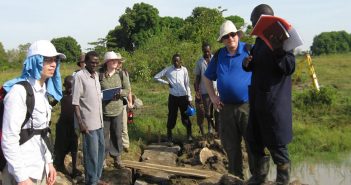By Erica Scalise
Students built a $40,000 farm to stimulate economic growth in a Uganda village (Photo courtesy of Delaney Coveno).
This past March, Fordham’s Engineers Without Borders (EWB) chapter hit a milestone when its students’ first fish farm began servicing families of the Omorio Village in Uganda.
Fordham’s chapter of EWB is working to meet technical design and funding requirements to implement its second fish farm. The club hopes to build the farm for the Kaloaki Village in Uganda by this August.
Vanessa Gutierrez, FCRH ’18, co-president of the club, became involved with EWB during her freshman year at Fordham.
Building one of these farms costs approximately $40,000. These high costs are a result of the need to meet sustainability and U.S. engineering requirements, according to Gutierrez.
These fish farms provide additional food sources to the community and work to provide economic stimulation via the income earned from selling harvests. Families often use the income from these harvests to pay school fees for their children.
“[These] are going to have a life changing impact on real families,” said Gutierrez. “The real world experience our students get out of a project like [this] is both incredibly valuable and rewarding.”
Fordham’s EWB chapter is one of many chapters within EWB USA, a national nonprofit organization consisting of professional and student chapters. The chapters partner with communities lacking basic resources that can be provided via an engineering solution. These needs can range from water purification, electricity, educational structures and agricultural advancements.
Founded in 2013, Fordham’s EWB adopted its first project to implement a hatchery and farms for villages in the Serere District of Uganda. Students and faculty have been committed to furthering this project for years despite encountering difficulties along the way.
Dean of Fordham College Rose Hill Maura Mast, who has worked with EWB since her first year at Fordham in 2015, has watched the club make ongoing strides to adopt these projects.
“I worked closely with them in spring 2016 when they needed a letter of support from the university because Uganda was under a U.S. State Department travel alert,” said Mast. “I was then, and still am, very impressed with how organized and intentional the group is about their work.”
Gutierrez said that students are responsible for every aspect of these projects.
“We create the fish farm engineering designs approved by U.S. professional engineers, maintain the business plan, budgeting and accounting responsibilities,” said Gutierrez. “We also fundraise 95 percent of the project costs and travel to Uganda yearly with a professional mentor to conduct on site technical evaluations and oversee successful project completion.”
Gutierrez said this experience can help students like her gain qualitative experience in marketing, accounting, budgeting, fundraising, grant writing and developing technical designs from their conception to construction.
“Students develop qualitative skills like working on a team, delegating responsibilities and communicating effectively with a variety of stakeholders [such as] university students, faculty, administration, alumni, engineering professionals, donors and reps that partner with NGO,” said Gutierrez.
Ryan Riviere, FCRH ‘18, engineering and design lead, said Gutierrez reached out to him and pushed him to start attending meetings this year. The result has been a positive experience, according to Riviere.
“Although I haven’t been fully involved from the start, this last year alone has been super rewarding,” said Riviere. “On top of knowing that I am using my knowledge of engineering to benefit people, I have also made a lot of connections and friends through EWB.”
Dean Mast expressed admiration for the students conducting this work and currently oversees the chapter’s work each semester.
“Through their experiences both in New York and in Uganda, these students are developing strong global competencies and culturally diverse perspectives,” said Mast.
“The EWB students are living the mission of Fordham. They are putting their knowledge and their education to work to solve real problems in the world.”





